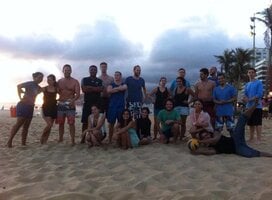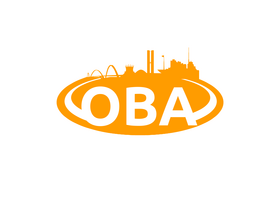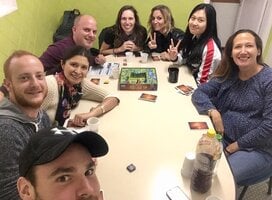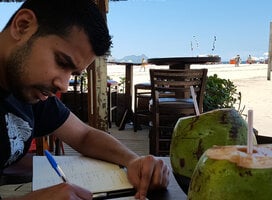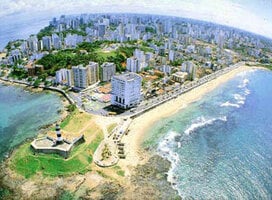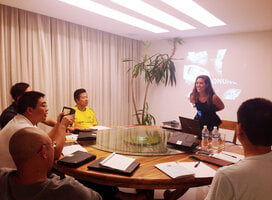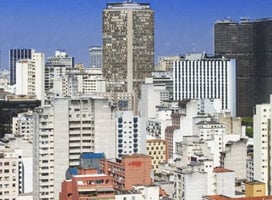Portuguese Language Schools in Brazil
While Portuguese, of course, started in Portugal, it was in Brazil that it took on new life. With hundreds of millions of Brazilians chatting away in Portuguese, you may find yourself itching to join them.
Brazil is full of life, from hurried streets of Rio and pulse of Carnivale; from the roar of the football stadium to the hush of cool waves lapping at white sand beaches. You can see it in green, dense rainforest and in the endless flow of the Amazon River.
Overall, learning Portuguese in Brazil means that you'll be learning an easier version of the language (perfect for beginners), and is ideal for Portuguese learners who later want to use their language skills in North America or international business.
So, are you looking to learn a slightly easier version of Portuguese in a vibrant, oh-so-Latin, country -- while getting ahead in your career? Look no further than Brasil.
You’ve probably heard a lot of talk about different learning styles. While you know yourself better than we do, here are our tips on finding best kind of language program to suit your needs. You’ll find that picking up Portuguese will get way easier if you play to your strengths!
Group courses
These courses are great if you are a kinesthetic, interpersonal, or verbal learner, which means you learn best by moving, talking, and interacting with other students. Group courses are easy to find with many different language schools in big cities like Rio and São Paulo and in more subdued areas outside of the urban centers.
University courses
These classes can come in many different forms, but in Brazil they are mostly lecture based. University classes are best for those who need college credit, prefer an individual learning environment, and like to make logical connections on their own.
Language study & culture immersion programs
These program are also great if you are a visual or kinesthetic learner. Vocabulary can be listed to a samba beat, prepositions practiced in a cooking class, and verbs can be painted into an image of the Pacific Ocean!
Private tutoring
This is the most flexible type of language course, because students can set their own schedule and learning plan. Although they can get pricey, private classes can be adjusted to fit your learning style exactly, making it the most efficient way to learn a language.
Rio de Janeiro
This is one of the most beautifully situated cities in the world -- encircled by prominent mountains, white-sand beaches, and lush rainforests, the city exudes a distinct, unparalleled energy that is sure to mesmerize you. Language learners will find it impossible to resist the urge get out and practice their Portuguese language skills.
Sã;o Paulo
São Paulo isn't exactly known for its charm and beauty like Rio, but as the largest city in South America and the economic center of Brazil, it has some serious draws.
For one, its cosmopolitan population (it has the biggest Japanese community outside of Japan) and its endless corners to explore make it a wonderful experience for language students. São Paulo also has a number of excellent universities to choose from!
Highlights
- Check out the crowd: 190 million people (almost the entire Brazilian population) speak Portuguese.
- Did you know...? Voting in the elections is compulsory in Brazil; everyone between the ages of 18 and 65 has to vote by law.
- School’s out, let’s have some fun: Brazil is home to approximately 1/10 of the worlds wildlife—so why not go explore?
- Wow others with an idiom! Não há galinha gorda por pouco dinheiro. Literally, “there are no fat chicken for little money (for cheap)” or “there’s no such thing as a free lunch”
Do I need a visa?
For citizens of the US or Canada, you’ll need a visa to enter Brazil. It’ll cost you at least $160 USD (or $80 for Canadians) and last for 90 days and up to 180 days with a one time extension.
If you wish to remain in the country for a longer than 6 months, you'll need to apply for a student visa (which is something to consider for both adult and student learners alike -- just so long as you're enrolled in an institution in Brazil). Contact the Brazilian consulate in your area for detailed and up-to-date info.
What are some not to miss cultural immersion activities in Brazil?
The best part of traveling abroad to learn Portuguese is the opportunity to explore one of the most vibrant examples of Portuguese-speaking culture, and all the wonderful activities the country has to offer. After all, you can't fully understand a language without knowing about the culture, right?
If you want to get out of your comfort zone and meet and greet with the Brazilian population, consider volunteering. When you give back to the local community you’ll go see way more than the typical tourist.
If you’re going abroad to take a break form the hustle and bustle of the real world, sit back, relax, and get into some Brazilian Telanovelas. Ubiquitous in the country, Brazilians get into these soap operas in a BIG WAY, and can wax poetic about the various twists and turns. Just ask anyone about their favorite and make an instant new friend.
Then of course, don't forget the biggie: Carnival. Chaotic, colorful, and wonderful, it's Brazil's biggest and most infamous party.
In general, Brazil isn't quite the budget destination that most people would expect in Latin America. Although you can definitely cut costs by getting out of major cities, eating local, and staying in dorms, it's by no means dirt cheap (especially in Rio).
According to Lonely Planet, budget travelers should budget about $60 / day while in Brazil -- a little less if you're sticking around long term and saving money by renting an apartment and forgoing long distance bus tickets for nights out with new friends.
Scholarships
For Portuguese learners who are still enrolled in school, you might be eligible for a scholarship:
Bridge Abroad offers funds to students heading to Brazil with their language programs, and BRASA gives $1,500 to undergraduates traveling to Brazil for the first time.
